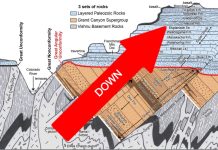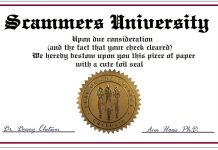
Dear Andy:
My name is Richard. I am 17 and going into Grade 12 this September and I don’t know if I should study engineering or geology. My dad is a courier and my mom works at the Super Mart, so they really have no clue. Please help.

Dear Richard:
Okay here’s the deal. No matter which of these 2 paths you decide to take, from your first day of university all the way through retirement, beer (and plenty of it), will be right by your side – it is your friend, so be very nice to it.
In university, expect to be beer-pressured into partaking (and excelling) in annual B**r Olympic gatherings. Attending these festivities is an integral part of your undergraduate training, so prepare for this either way.
From a social point of view on the engineering side of things, you will be an outcast because your social skills will be marginally better than those of a Cheshire cat. That’s right, non-engineering folk will look at you funny and poke fun of you – many will believe that you have some sort of social retardation. As an engineer, you will be considered an extrovert if you stare down at the shoes of the person with whom you are talking, rather than staring at your own shoes. Geologists tend to be a little bit more outgoing and a pleasure to be around, but non-geologists and non-engineers will still give you funny looks. Dick, you will likely have a full-rimmed Tilley hat by 2nd year (you’ll need them for those exciting field trips), and you’ll start resembling Indiana Jones by 4th year.
If you are very poor at math and you like to make stuff up, then geology is likely better for you, Richard. On the contrary, if you are great at math, very analytical, exacting, and things need to make sense to you, then engineering is the way to go. Geology is the only profession that I can think of where you can have a widly successful career, yet never take a math course post highschool.
If you are unsure about how you feel about math, try the following skill testing questions:
Simplify the following expression: y(x) = sinx / x
Answer A:
That function cannot be simplied any further.
Answer B:
y = 666 Justification: sinx/x* = sin/1 = sin = 666**, *because the x’s cancel, **666 is the number of the devil, and he sins
What is a cosine?
Answer A:
It is the trigonometric function that is equal to the ratio of the side adjacent to an acute angle (in a right-angled triangle) to the hypotenuse.
Answer B:
It is the process of having somebody with more money than you have, sign a lending agreement such that he or she will take over the payments if you stop making them.
What is 20 + 5?
Answer A:
Assuming that these 2 operands are both represented in Base 10, the answer is 25 (Base 10).
Answer B:
What is that cross looking thing between those 2 funny looking letters?
Well, it’s pretty obvious from this test that if you answered A to all 3 questions, then engineering is for you. If you answered B to the questions, then you are already three quarters of the way through a geology degree. If you answered some A and some B, then you’re on your own, Richard. Good luck, buddy.
All the best,
Andy Killinger, Staff Counsellor
Proved Plus Probable News




















I would add another big difference between engineers and geologists: the first prefer to stay indoors in front of their computers, and geologists will go outside as much as they can, carrying a hammer, a compass with them, and some beer, of course…
Yeah, but geologists lick rocks. Normal people aren’t interested in licking rocks, they really aren’t. I’m not kidding.
Some more Geologist math:
Expand (a+b)^2
(.a.+.b.).^.2
(..a..+..b..)..^..2
(…a…+…b…)…^…2
(….a….+….b….)….^….2
(…..a…..+…..b…..)…..^…..2
Phil, your message was spoken like a true engineer.
materials, and strain, stress relationships you will be learning and applying the same principles but towards anisotropic , inhomogeneous materials that make up the earth.
This scares engineers as they are used to isotropic and homogenous materials. The realm of the unknown and being inexact startles the average engineer, leaving him shaking in his computer chair.
If you decide to work as a Economic Geologists in either the oil & gas sector or mining; this field is very useful with ample business opportunities and important applications for other fields such as stock analysis and investment banking.
They are both respectable fields, engineering does seem more anti-social. Both fields offer plenty of opportunity to build a successful career that pays above average and both are applied sciences.
I studied geology and I love it, and everyone else in my year loved it.
Hope that helps,
Yeah…GO ANDY!
Thanks for a marvelous posting! I definitely enjoyed reading it, you could
be a great author. I will be sure to bookmark your blog and may come back
in the foreseeable future. I want to encourage you continue your great posts, have a nice afternoon!
@Geologist: Yeah, that helps (I think?).
@Bess: We are all very glad that you enjoyed reading this article.
Thanks for commenting.
This writer has absolutely no idea whats he talking about. In order to get a geology degree, you need to complete a year college calculus and some uni require more than that. It’s basically the same amount of courseworks as engineering. Sorry dude but dont mislead people, you should write more about bedtime stories rather than this kind of article
Hello Youre stupid [sic], thanks for the comment.
So you’re telling me that there is basically the same amount of mathematical coursework in a geology undergrad as there is in an engineering undergrad degree? This makes me think that you are a geologist, because that math right there is waaaaaaay off.
And thanks for the recommendation for writing bedtime stories – we think that’s a great idea. Coming soon! “Bedtime Stories by 2P News,” no joke.
Cheers,